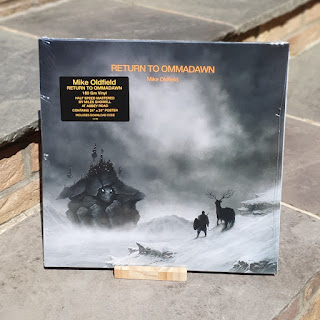 What were Andy and Paul thinking when they released this record? Having achieved platinum sales and numerous plaudits for their third album, they decided to sacrifice their career at the alter of art for the follow up.
What were Andy and Paul thinking when they released this record? Having achieved platinum sales and numerous plaudits for their third album, they decided to sacrifice their career at the alter of art for the follow up.
For OMD, commercial success did not equate to credibility and only a record made up of samples, sound collages and musique concrète could possibly restore their artistic integrity.
Today you could argue that they achieved their goal as "Dazzle Ships" is seen as an intellectual album that pushed the boundaries of contemporary pop. Yet back in the day it was widely panned and did not sell well. I'm not even sure this record sells today as I have seen the recent 40th anniversary coloured vinyl edition being offered for as little as £15.
So what is wrong with this album? Well, truth be told there isn't too much amiss. Tracks like "Time Zones", "The Romance of the Telescope" and "Silent Running" are really good compositions and the singles "Telegraph" and "Genetic Engineering" have true pop potential. What seems to drag the album down is the production.
I definitely get the sense Andy and Paul had a new toy in the form of the EMU Emulator and decided to go to town with it. When pop tunes are allowed to emerge they are soon drowned in a sea of radio tuning, sonar
pulses and vocal samples. Whilst earnest in intent, this approach didn't suit a casual pop audience and the album didn't even come close to matching the expectations of the record company.
In fact, you could argue that the break up of the band started with the commercial failure of "Dazzle Ships". OMD wouldn't dare return to such lofty concepts again and a constant push
for commercial success led to dissatisfaction in the band. When they went their separate ways in 1989 OMD were still running on a treadmill designed to regain the sales flushed away by "Dazzle Ships". Still, it's quite a good album.
The second disc of the 2023 remastered version contains a number of demos and a live track that add twenty minutes of music. These early versions are only of interest to aficionados, but then that is exactly who the 40th anniversary edition is aimed at. An original copy with a die cut sleeve will cater for the needs of the majority. 3/5






